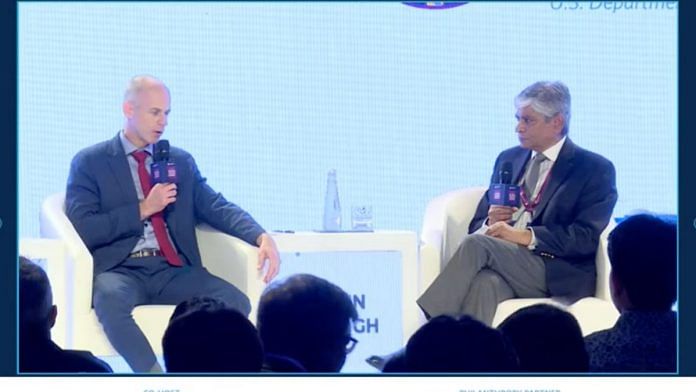New Delhi: The main barrier to India-US ties revolves around concerns about technology, highlighting the centrality of iCET (India-US Initiative on Critical and Emerging Technologies) to the relationship between Washington D.C. and New Delhi, said Seth Center Tuesday, while speaking at the Global Technology Summit organised by India’s Ministry of External Affairs and Carnegie India.
Center, the acting special envoy for critical and emerging technology, the US Department of State described technology as the “fulcrum” of the issues between the two countries.
“The extraordinarily important partnership that the US and India have across a whole range of issues…and then I think about the achievements or barriers to achieving those shared partnership objectives and recognise very quickly that technology is the fulcrum of the issues we are concerned about,” explained Center to moderator Arun K. Singh, non-resident fellow Carnegie India and a former Indian ambassador to the US.
He added: “Therefore technology should be at the centre of the dialogue between our two countries. And our National Security Advisors under the leadership of our Prime Minister and President recognised very quickly that if you wanted to lock in an enduring partnership…you have to deepen the relationship in these technology areas.”
The iCET was launched by Prime Minister Narendra Modi and President Joseph R. Biden Jr. in May last year to “facilitate outcome-oriented cooperation in new and emerging technologies”. The initiative is co-led by the National Security Council secretariat in India.
Earlier Monday, the two countries agreed to broaden the iCET framework incorporating biotechnology, critical minerals and rare earth processing technologies, digital connectivity and digital public infrastructure and advanced materials.
These decisions were made during the comprehensive mid-term review of iCET by Vikram Misri, deputy national security advisor (NSA) and his counterpart Jonathan Finer, US’s principal deputy NSA.
The iCET review between the two deputy NSAs is the first publicly announced engagement between Washington D.C. and New Delhi after last week’s indictment of an Indian national in an alleged assassination plot — adding credence to Center’s emphasis on the centrality of technology to India-US ties.
‘Enduring component’ to US-India ties
Center said the relationship between the “suite” of technology concerns” and the role of India-US ties are inseparable.
“The relationship between the suite of technology concerns that we have in the world, the role of US-India relationship are now inseparable…we now believe that technology is the enduring component, really the underpinning in many ways of our [US-India] relationship and needs to be institutionalised,” Center said.
The acting special envoy noted the significance of iCET owing to the “breadth” of issues it covers as well as the “depth” of the framework in specific technology areas. He highlighted the nature of the dialogue as that of a “national security dialogue” led by the national security advisors of the two countries.
“The great value in the iCET structure is when you hear your national security advisors say one of these particular technology areas matters so we want to make progress on this particular topic, it changes the conversation in fundamental ways,” Center explained.
He added: “It has changed the nature of these dialogues in the intellectual and think tank community, it has changed the nature of the dialogues we have with our partners by virtue of the elevation within the US-India relationship and I see it being an enduring component of the [US-India] partnership going forward.”
(Edited by Poulomi Banerjee)
Also read: There’s a straight line from Modi govt misreading Punjab farmers’ protests to the Pannun saga



